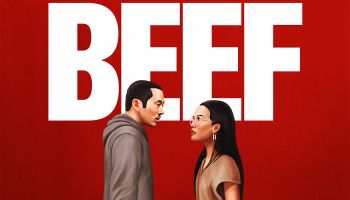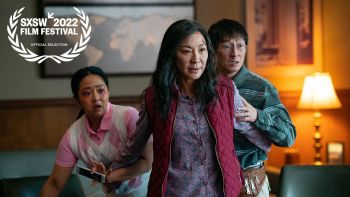Poetry has long been one of the most difficult, yet gratifying forms of self-expressions to master.
In 2008, Greg Jacobs and Jon Siskel documented four high school students daunted by stereotypes who participated in Chicago’s Louder Than A Bomb Poetry Slam to master the art.
VIDEO: Young Jeezy “TM103: Hustlerz Ambition” Documentary
The acclaimed documentary was picked up by OWN network and is set to air January 5th, 2012 at 9pm ET/PT.
The Emmy winning directors, who are also noted for their 9-11 archive inspired film “The 102 Minutes That Changed America” took some time to chat it up with GlobalGrind about the making of the moving documentary, and their take on reality television.
PHOTOS: Oprah Can’t Stop Raving About Melissa George!
Check out the exclusive interview below, and be sure to tune in to the riveting documentary tomorrow night at 9 on the OWN Network.
GlobalGrind: Tell us a little about the first time you heard about the Louder Than A Bomb Poetry Slam.
Greg Jacobs: A lot of the time, ideas for documentaries are totally accidents and that is how this happened. I drove by a club called the Metro and I looked up to see who was playing and it said “Louder Than a Bomb poetry final tonight.” There was a line of kids down the block of all shapes, colors and sizes and it was such a strange thing to see because Chicago is such a segregated city.
Jon Siskel: Greg actually came back to the office after seeing the event taking place and we talked about it and about poetry slam and it sounded like an interesting idea. Louder Than A Bomb’s Kevin Coval had done some very rough video taping of past events and just through that home movie style version of the slam you really got the sense that there were these very powerful poems and stories being communicated. The other kids in the audience really just freaked out after every poem and in that moment, just seeing this, I was like, ‘Wow we have just got to do this.’
How did the making of this differ from the making of Witness Katrina and The 102 Minutes That Changed America? How was the process different for you?
Greg: 102 Minutes and The Witness shows are archived based. They reconstruct moments in history with minimal narration so it was an entirely different experience than this. With LTAB we are going out and shooting with people, getting to know the character and earning their trust. You’re hanging out with them, not knowing what is going to happen.
John: Here it is much more of a traditional documentary style where Greg and I were reaching out to Kevin, finding the characters that we wanted to cover. Greg and I would go to the schools and bring cameras and just meet the kids, their coaches and their families and once we started filming, it was like a fly on the wall type of documenting.
You’ve won multiple Emmys for your prior work, tell us about that moment when you hear your name announced.
Greg: It is still incredibly nerveracking. You never believe you’re actually going to win. We always have so much respect for the other people in the categories, so you always think that it is really nice to be nominated, but yeah right. The announcement is always accompanied by genuine surprise which kind of makes the speeches a little tricky, I never have anything prepared.
Jon: Greg was away for two of the awards, so I got to take the stage for both of us and it is just the most incredible rush. You just never expect that to happen. I literally leaped over a railing and started sprinting. I took this epic leap over the railing, was high-fiving people on my way to the elevator and then I had to stand there and wait for the elevator to come, and the guy giving out the award was like, ‘Come on where is he?’
With over 600 kids involved in the Louder Than A Bomb slam, why did you guys decide to choose your four subjects?
Greg: We narrowed it down over the course of a year to kids from 4 schools and then we went to the event the year that we started shooting and those same 4 were just jumping out at us. The kids who were watching the show were also a great help because we would ask around and they would vote for it too.
Jon: We wanted amazing poets and then we wanted a geographic diversity so were looking at schools around Chicago, we were just trying to find all these different ways of looking at the kids.
Did you run in to challenges while you were shooting the documentary?
Greg: There is always a challenge at the beginning to get the subjects to open up and gain their trust, but because this is sort of what they do, they get up there and tell their lives in poems, it didn’t take nearly as long to get them to open up as it normally does.
Did you find yourself getting emotionally attached to any of the subjects you were covering? Did you have one person in particular who you were more attached to than others?
Greg: It is impossible not to. It is not something you try to avoid. It is a very complicated relationship where you want to be just a fly on the wall and disappear, but you kind of have to earn that trust and get close to people in order for that to happen. There are scenes in the film that people think, ‘I can’t believe they allowed you to be there,’ but we just became such a part of their journey that they trusted us to be there as part of the scenery after a while. It is impossible to hear their personal stories and their poems and not be emotionally involved. There are moments when you are crying while you’re filming, or editing or just watching and at those moments you know it is something special.
Jon: At the end there is this scene where Adam wins the Spirit of the Slam award. I was looking through he camera and I had a feeling that he was going to win, so I start focusing on his parents. I remember seeing them hugging each other through the lens and just crying through the camera as I was filming them. There were so many emotional moments. We were weeping watching the edits.
When you guys were editing and shooting did you think the documentary would have as much success as it does now?
Greg: It is kind of a crazy thing. You really have no idea how these things are going to turn out but you have to carry out the idea that it is going to go right and you’re going to connect with a lot of people.
Jon: Just like the Emmys, I don’t think you can ever imagine that. Unlike the other work we have done you never really get to engage with audience. I think it was addictive for us, just going out and showing the films and getting the feedback from the audience.
In your field of work how do you feel about reality television? Do you have a favorite reality show that you watch?
Greg: I sort of love watching it for the craft because great story telling is great story telling no matter what it is.
Jon: I love it, I don’t think it is a lesser form of television and for my favorite show right now I haven’t watched every season of it, but I am going to say Survivor. I’m going old school.
















